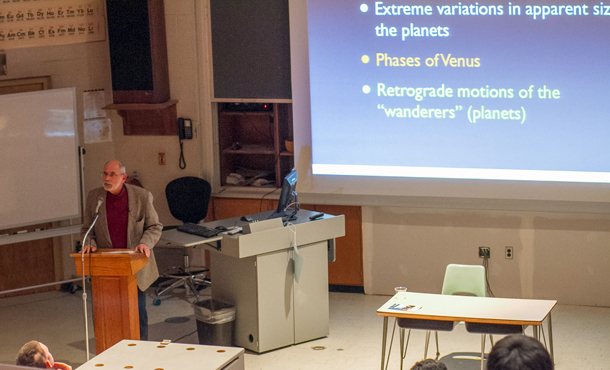Have you ever wondered if animals are conscious? Are plants conscious? Does an amoeba have free will?
David Pruett, James Madison University emeritus professor of mathematics, recently argued in a Suter Science Seminar that particles as basic as electrons and photons may have at least some elemental consciousness and free will.
Evolution, then, is a distilling process that concentrates elemental consciousness into higher consciousness in the more complex organisms such as humans, Pruett said, acknowledging the views of scientist-priest Teilhard de Chardin.
Pruett’s lecture “Reason and Wonder” took its title from his 2012 book Reason and Wonder: A Copernican Revolution in Science and Spirit (Praeger). The work was the result of a celebrated honors undergraduate course that Pruett developed and taught six times at JMU, “From Black Elk to Black Holes—Tales of a Mysterious Universe.” The book has earned a CHOICE Award from the American Library Association.
A former NASA researcher and award-winning computational scientist, Pruett has been teaching at JMU since 1996 and at several institutions before that. He blogs regularly about science, climate, religion, and politics at Huffington Post. His views of reason, faith and identity have also been featured in a lengthy two-part interview with peacebuilder Yago Abeledo, MA ’14.
Pruett began his lecture by describing the accomplishments of Isaac Newton. This well-known scientist “contributed more to modern science than any other single individual,” said Pruett. Newton’s book, Principia Mathematica, describes mechanics, calculus, fluid mechanics, and the applications of these principals. One application includes the orbit of planets around the sun.
Despite his achievements, Newton was a humble man. He famously claimed that “If I have seen further it is by standing on the shoulders of giants.” Pruett explained that these “giants,” who established the foundation that Newton built on, were scientists, including Copernicus, Galileo, and Kepler.
Copernicus is well known for rejecting the idea that the planets and stars revolved around the earth. He opposed the church-supported geocentric model and proposed a heliocentric model. Galileo further rejected ancient beliefs by perfecting a telescope and turning it heavenward. He saw craters on the moon and moons around Jupiter, unquestioningly proving that not everything revolved around earth. Kepler further supported Copernicus by making careful measurements of the celestial motions.
After explaining the history behind the science, Pruett took a philosophical turn. He mentioned that Newton’s ideas encouraged the idea of determinism. Determinism suggests that, if an intelligent being knew the location, velocity, and force of every single particle in the universe, that being would be able to precisely predict the future. In other words, the future would be determined by the laws of nature. There would be no room for free will.
Pruett then claimed that modern science has invalidated determinism. On the atomic level, particles can act in very strange ways. He used the example of radioactive decay: if you have a collection of identical atoms, you can predict the rate at which the aggregate decays.
But “you cannot predict when an individual atom will decay,” said Pruett. “You can only find the probability.”
Pruett further discussed the relevance of this idea to human freedom. If elementary particles are undetermined, how can one claim that the universe is deterministic? Pruett extensively cited de Chardin, describing cosmology and evolution as processes involved in creating higher consciousness.
Pruett said he felt liberated to share what he calls “somewhat unorthodox views”after reading the titles of the other Suter seminars. Such an environment didn’t force him to “play it safe” for his audience of approximately 60 students and faculty.
The Suter Science Seminar series consists of 17 expert presentations – averaging two per month – during the fall and spring semesters. Visit emu.edu/science-seminars for information about future talks.
